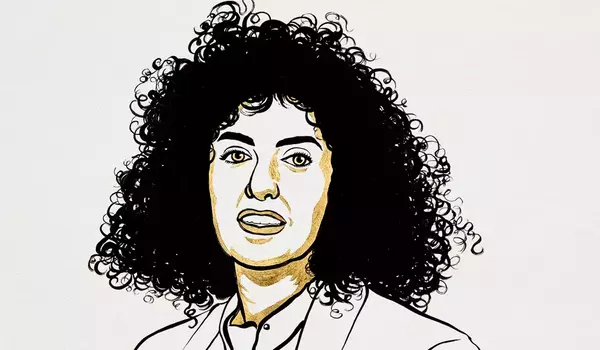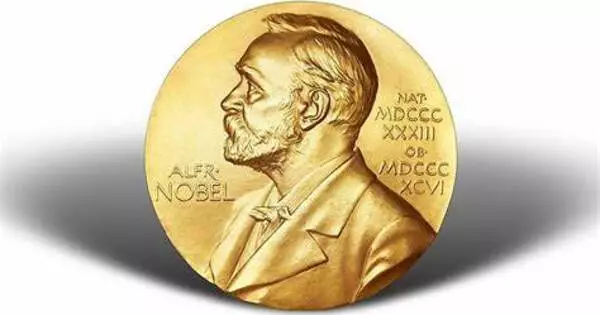The Norwegian Nobel Committee awarded the 2023 Nobel Peace Prize to incarcerated Iranian activist Narges Mohammadi for “her fight against the oppression of women in Iran and her fight to promote human rights and freedom for all,” the Norwegian Nobel Committee announced in Oslo on Friday.
Mohammadi, 51, was sentenced to more than 30 years in prison and is barred from contacting her husband or children. Her name has become synonymous with the fight for human rights in Iran, where widespread protests erupted last year in the aftermath of Mahsa Amini’s death. Amini, a 22-year-old lady, had been detained by the regime’s notorious morality police.
The Nobel Committee stated in awarding the prize to Mohammadi that it “recognizes the hundreds of thousands of people who demonstrated against theocratic regimes’ policies of discrimination and oppression targeting women in the preceding year.”
“Her valiant struggle has come at a high personal cost. The regime has arrested her 13 times, convicted her five times, and sentenced her to 31 years in prison and 154 lashes,” said Norwegian Nobel Committee head Berit Reiss-Andersen at the ceremony.
“Ms. Mohammadi is still in prison as I speak,” Reiss-Andersen said.
This prize is not just for Narges; it is for all the people of Iran. A movement in which Iranian women and men took to the streets, stood for months, and fought to show that they would continue to struggle for democracy and civil equality.
Taghi Rahmani
In a message shared with CNN by her family on Wednesday, Mohammadi said she will continue to strive for “democracy, freedom, and equality” if she wins the prize. It is unclear whether Mohammadi is aware of her victory. According to her friends and relatives, those jailed in Iran’s renowned Evin Prison are not permitted to receive phone calls on Thursdays and Fridays.
Mohammadi stated in the statement that she would remain in Iran to continue her advocacy “even if it means spending the rest of my life in prison. I will continue to fight alongside the brave mothers of Iran against the oppressive religious government’s relentless discrimination, tyranny, and gender-based oppression until women’s liberation,” she stated.
Taghi Rahmani, Mohammadi’s husband, told CNN that the prize is “for all the people of Iran.” Rahmani, a fellow activist and former political prisoner who served a total of 14 years in regime jails, lives in exile in France with their twin children.
“This prize is not just for Narges; it is for all the people of Iran. A movement in which Iranian women and men took to the streets, stood for months, and fought to show that they will continue to struggle for democracy and civil equality,” Rahmani said.

Mohammadi’s family added in a separate statement to CNN, “Although the years of her absence will never be compensated for us, the reality is that the honor of recognizing Narges’ efforts for peace is a source of solace for our indescribable suffering.”
She hasn’t seen her children in over eight and a half years, and she hasn’t heard their voices in over a year. All of this represents what she has gone through in order to achieve her goals. As a result, for those of us who know that the Nobel Peace Prize will help her achieve her goals, this is a joyful day,” the family statement continued.
The Iranian government slammed the award on Friday, calling it “biased and politically motivated.”
“The action of the Nobel Peace Prize committee is a political maneuver in line with the interventionist and anti-Iran policies of some European governments, including the host state of the Nobel committee,” said Iran’s Foreign Affairs Ministry spokesman, Nasser Kanani, said in a statement published on X.
The political detainees housed at Tehran’s notorious Evin jail were made aware of last year’s wave of protests. Ms Mohammadi gained command once more. She conveyed her support for the demonstrators from prison and organized solidarity actions among her fellow inmates. The jail administration retaliated by setting even tighter conditions. Ms Mohammadi was barred from receiving phone calls or visitors. Despite this, she was able to smuggle out a piece that the New York Times published on the one-year anniversary of Mahsa Jina Amini’s murder. The message was simple: “The more of us they lock up, the stronger we become.” Ms Mohammadi, while imprisoned, has managed to keep the protests going.
Narges Mohammadi is a female human rights activist and liberation fighter. The Norwegian Nobel Committee wishes to honor her brave fight for human rights, freedom, and democracy in Iran by awarding her this year’s Nobel Peace Prize. This year’s Peace Prize also recognizes the hundreds of thousands of people who demonstrated against theocratic regime’s practices of discrimination and persecution against women in the preceding year. Only by adopting equal rights for all will the world attain the international fraternity that Alfred Nobel wished to promote. Narges Mohammadi’s achievement continues a long tradition of the Norwegian Nobel Committee awarding the Peace Prize to those seeking to enhance social fairness, human rights, and democracy. These are critical prerequisites for long-term peace.
















